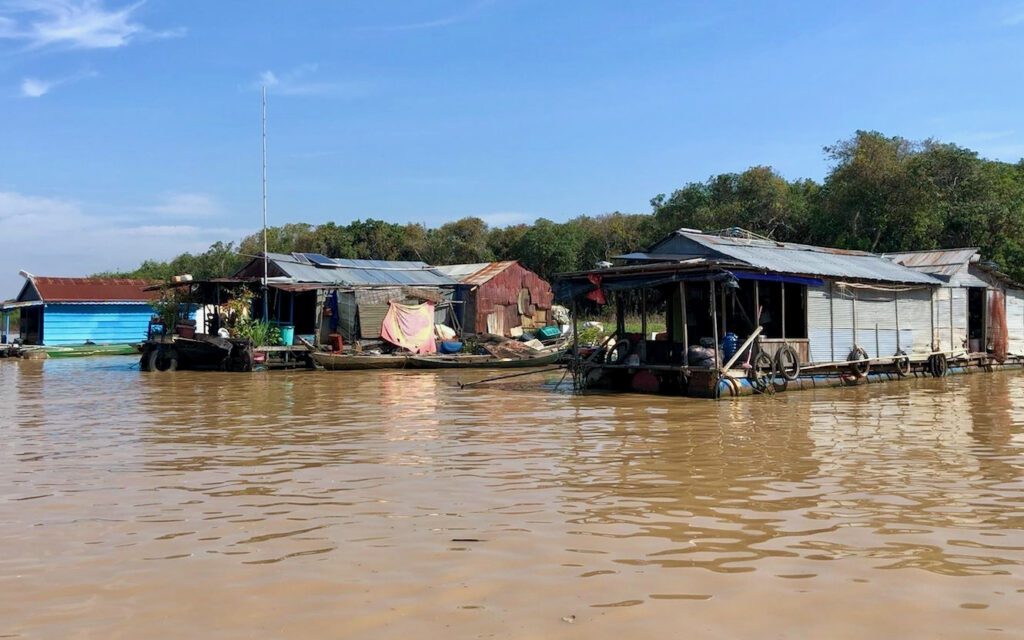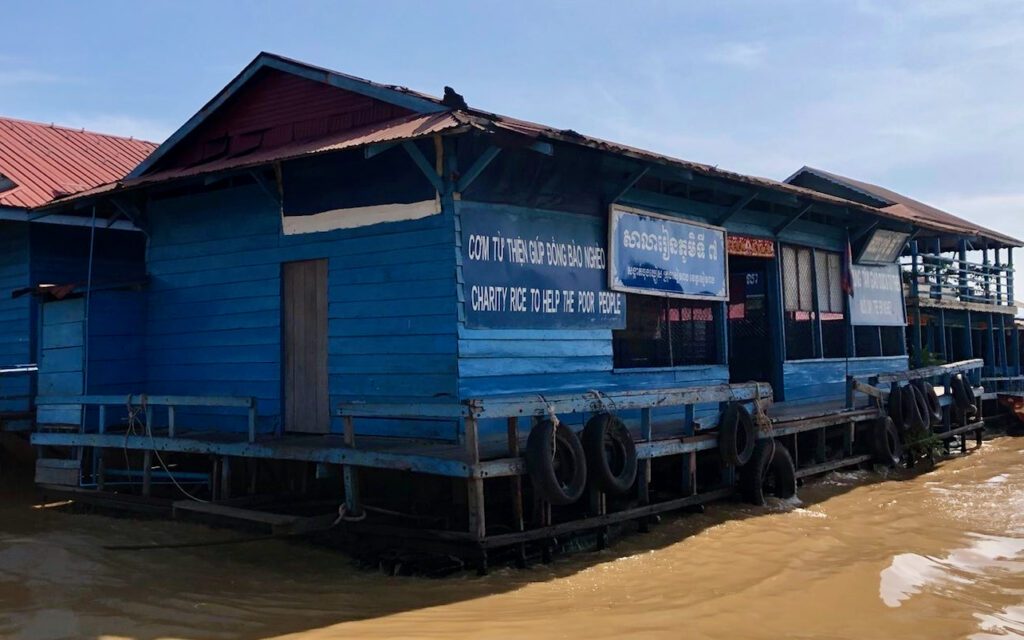Ethnic Vietnamese people living in a popular Siem Reap tourist destination say dozens of families in their community have fled in the last year, spurred by an illegal fishing crackdown that saw dozens of boats confiscated and ongoing alleged extortion by the local Vietnamese association.
A minority group that receives regular vitriol from the rest of the country, ethnic Vietnamese are estimated to make up around 400,000 in Cambodia but largely lack citizenship, meaning they cannot own property or use public services even if they were born in Cambodia. Many live in floating homes around the Tonle Sap and fish for a living.
In Siem Reap’s Chong Khneas village, below the hill of Phnom Kraom along the edge of the Tonle Sap, ethnic Vietnamese families have lived for decades in small, colorful houseboats, operating a robust fishing economy.
The families migrate to the middle of the lake during the dry season and dock closer to the shore during the wet season. Tourists pay for boat rides around the shoreline. Kids grow up speaking Vietnamese and Khmer.
But in recent years, fast-disappearing fish populations in the Tonle Sap have caused the community to dwindle from a peak of about 1,000 families to around 300. Now pressure from local and national authorities — and the local ethnic Vietnamese association that is meant to serve as their advocate to the country’s Khmer majority — has prompted another 70 families to flee to Vietnam in the last eight months alone, residents say, shrinking Chong Khneas to about 230 ethnic Vietnamese households and putting a pall of fear over those that remain.

Of the dozen or so ethnic Vietnamese residents that reporters met during a late January visit, only a few said they could speak about problems with authorities. All declined to provide their names, saying the village’s situation had deteriorated in the past year.
“People don’t dare to speak out about what’s happening here,” said one elderly man. “Everyone is scared.”
On a national level, the Khmer Vietnamese Association provides ethnic Vietnamese families with charity, arranges permanent residency cards and attends meetings with local officials — a majority of whom are Khmer — on residents’ behalf.
But it plays a different role in Chong Khneas, colluding with local Khmer authorities to extort money from people and threatening or detaining those who fail to pay up. Residents allege that the local association charges $50 monthly per family to go fishing, whether they use illegal equipment or not.
Those who cannot pay are forced to pay higher fines to the association leaders directly, and sometimes local authorities, lest they be accused of illegal fishing. One 44-year-old woman said that when her relative couldn’t afford the $50 charge for January, the association threatened to confiscate his boat. Then they took him on shore, where he negotiated with commune authorities to accept a 500,000 riel or $121 “fine” when he came up with the money.
The process repeats itself whenever someone can’t pay, which happens throughout the year, the residents said. Although they acknowledged that some residents are indeed fishing with illegal nets or equipment, the fee and threat of detainment apply regardless of whether people are breaking the law.
“If you don’t pay, they’ll say, ‘You didn’t pay – let’s detain you,’” the elderly resident said. “And if you give them money, they’ll let you go free.”
Association leaders have also allegedly warned residents against telling national authorities about the fee.
Sim Chy, president of the national Khmer Vietnamese Association, declined to answer questions beyond saying that he did not know anything about the alleged fishing payments. Local Chong Khneas authorities also said they did not know but emphasized there should be no fees or licensing costs associated with subsistence fishing.
Local village chief Soun Chhay, whose jurisdiction also covers the floating village, said he didn’t want to comment on ethnic Vietnamese affairs. “That’s their work and business which I don’t know about,” he said.
“I don’t know what kind of tools they are using,” added commune chief Orm Nary, implying it was not uncommon for people to make unofficial payments to use illegal fishing equipment. “I can’t answer more about this. Why are they paying money?”
A national illegal fishing crackdown has meanwhile put compounding pressure on the community. Starting last March, authorities from the Ministry of Agriculture, Forestry and Fisheries raided villages around the Tonle Sap and confiscated fine-mesh fishing nets, electric shock equipment and boats that they said had underground trawlers to catch fish illegally.
Of the roughly 50 boats confiscated in Chong Khneas during the initial raid, at least seven were legal motorboats people used for daily activities, sending fear through the rest of the community, residents said.
“I don’t even know how to describe how it feels,” said fisher Ngouy Foerng soon after her family’s boat was confiscated last year. “The authorities took everything. Even the small nets, they confiscated.”
Since the first raid, national authorities have returned thrice more and taken another 15 small boats, leaving roughly 70 families without their boats.
The targeted crackdown on the minority group has led dozens of families to leave, either because they had their boats taken or were sick of paying the alleged extortion fees.
Two more ethnic Vietnamese residents were arrested in August and remain in custody, residents said. Village chief Chhay confirmed the two arrests but would not share more details except saying that there had been nine more residents illegally fishing who escaped.

There are differing estimates of how many families live in Chong Khneas now. Residents interviewed in mid-January said there were no more than 230 families left. Local authorities said there were about 350 families. Chy, the national association president, said there could be as many as 400.
Moving to Vietnam, however, is not an easy solution. Without citizenship papers from either country, people moving to Vietnam are confined to per-diem construction work, barred from more regulated jobs that would require identification and creating a boomerang effect between the two countries.
Treng Yang Khorn, 62, who is ethnically Vietnamese and was born in Cambodia, has tried migrating to Vietnam a few times over the years when he struggled to fish enough in the drying lake. He inevitably found his way back to the Tonle Sap after a short period of time, and now he’d never consider permanently leaving the lake.
“The hard part is the papers to get into the country, because without citizenship, you can’t really work in factories,” Yang Khorn said. In his supposed ancestral homeland, he was never able to find jobs except in the construction industry. “It was quite hard. When it rained, we had no money.”
In fact, the 44-year-old woman whose relative couldn’t pay the monthly fishing fee said that four of her relatives had already tried moving to Vietnam once after the boat confiscations but had returned to Chong Khneas in recent weeks when they, too, failed to find steady jobs.
She had wanted to join them but didn’t have the money to get there.
“I’m talking to you because I want to get help,” she said. “I don’t want to get rich. I just want to have a normal life and not pay for everything.”












